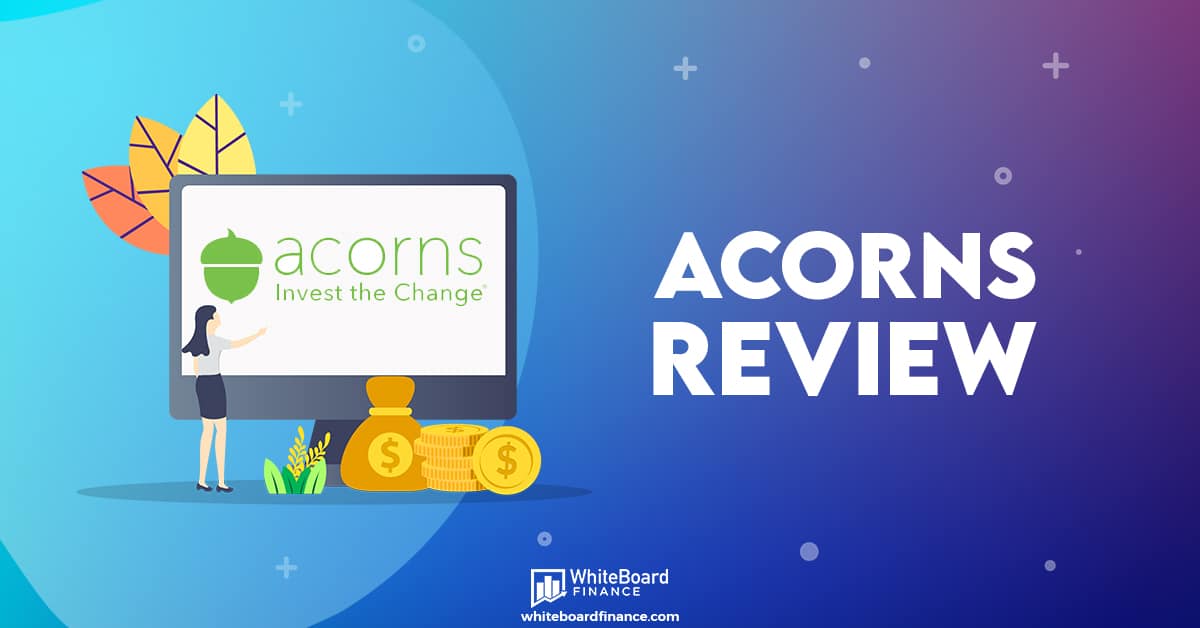I’m grateful to live in an era where investing is made simple and anyone can start growing their money in the market. You don’t need a high net worth or thousands of dollars in the bank.
Thanks to robo-advisors and micro-investing apps, you can start investing with your spare change. The latte factor is a popular concept that proves small but consistent investments can make a difference. If anything, it can help you develop a healthy savings habit that can be increased over time. So how do you get started?
This Acorns review will walk you through how to start investing with ETFs and fractional shares so you can decide if it’s right for you.
What Is Acorns?
Acorns started as a micro-investing app that makes it easy to invest your spare change. The company was founded in 2012 by a father and son duo who wanted to break the stigma of high investment minimums that most people often face.
Co-founder Jeff Cruttenden, who picked his first stock at the age of 11 with his dad, noticed when he got to college that a lot of his peers wanted to start investing but didn’t have the money to meet high balance requirements and cover management fees.
He and his father decided to simplify investment opportunities by launching Acorns. That way, anyone could start growing their money in the stock market with as little as $5.
Is Acorns Safe?
Acorns started as a platform that helps you invest your spare change rounded up from debit and credit card transactions. Today, Acorns has expanded to offer other features like an Individual Retirement Account (IRA), an online checking account, as well as an investing app for kids.
Deposits in your Acorns Spend account are insured up to $250,000 and the app is secured with 256-bit encryption.
More than 7 million people have signed up and in this Acorns Review, you’ll learn why it’s a solid option for beginner investors.
How Acorns Works
Acorns links with your checking account or credit card account so each time you make a purchase, the difference gets rounded up. For example, if you spend $4.50 at Starbucks, Acorns will take $0.50 from your account and invest it. Every bit counts and Acorns will wait until you reach at least $5 in roundups to transfer the funds to your investment account.
Over time, your balance grows due to more round-up transfers and compound interest. You can even increase your roundup transfers by 2 or 3 times or contribute a fixed amount to invest at a faster rate. Set up fixed weekly investment transfers for as little as $5.
With Acorns Later, you can open a tax-advantaged retirement account whether it’s a traditional IRA, Roth IRA, or SEP IRA. Just set up recurring automatic transfers to fund your IRA and contribute up to the annual limit for the current year. All you need is $5 to open an IRA with Invest Later and as with all IRAs, early withdrawal penalties apple.
Acorns Investment Strategy
By now you may be wondering why Acorns’ investment minimums are so low along with what you’re actually investing in. When you open an investment account with Acorns, you’ll be investing in ETFs (Exchange Traded Funds) which are made up of a broad range of stocks and bonds.
ETFs tend to replicate asset classes like the S&P 500 or the Dow Jones. Yet, they make it easier for investors to create a diversified portfolio without a lot of capital. While you can’t individually pick your stocks, Acorns will ask you about your investment goals and desired risk level. From there, your contributions and round-ups will fund fractional shares of stocks and bonds for:
- Large companies and corporations
- Smaller companies
- International companies
- Real estate
- Corporate bonds
- Government bonds
A fractional share represents a portion of a single share of stocks or bonds. If you can’t afford to invest in a full share of a company, Acorns still lets you own a piece of it through fractional shares which is a great option for beginner investors.
Acorns prompts you to follow an investment strategy that is highly diversified in the hopes of smoothing out dips in the market. If you’re investing in a little of everything, you won’t have to worry about having all your eggs in one basket if the market declines. This also makes it easier to bounce back when things start to improve.
Utilize Acorns’ performance tool to review which stocks and bonds you have and track your return.
Acorns Core Features and Benefits
Looking to do more than invest spare change and contribute to an IRA? Here are some other core features that you may want to try out and take advantage of.
Acorns Spend
Acorns Spend is an online checking account with no fees and free ATM access at over 55,000+ locations. Your Acorns Spend account is automatically tied to your Acorns Later and Invest accounts. This means you can still automatically round up transactions to invest and also save for retirement.
This is an FDIC-insured account where you’ll receive a metal Acorns debit card with a matte green finish and have full access to set up direct deposit, mobile check deposit, pay bills and more.
Acorns Found Money
Earn bonus investments when you shop online with this feature. Just like a typical cash back program, you’ll get a percentage of your purchase invested if you shop with an Acorns retail partner. For example, if you shop online at Walmart, Acorns may take 5% of your purchase and add it to your investment account.
Unlike roundups, these bonuses don’t come from your checking or credit card account. Just make sure you have an account linked and install the browser extension so you’ll be notified when you can earn as a bonus investment.
Acorns Early
Start an investment account for your child with Acorns Early. Acorns reminds parents that if you invest just $5 per day in a child from birth, considering an 8% average annual return, they could be a millionaire by age 50. Use your Acorns Early account to set recurring investments every day, week, or month and use the financial literacy content included to help teach your kids about money and investing.
Pricing and Fees
Acorns has a simple pricing structure with no added or hidden fees. There are different pricing tiers depending on which type of account you open. To invest spare change, the monthly fee is $1 for all balances under $1 million.
The Personal account is $3 per month and includes the retirement investing option, checking account feature with a metal debit card, bonus investments, and money advice.
The Family account is $5 per month and includes all the features in the Personal account plus Acorns Early accounts for kids.
Where Acorns Shines
Acorns levels the playing field when it comes to investing because you don’t need to have a sizeable net worth or a meet a high opening deposit. We all spend money most days and you can start investing simply by stashing away your spare change automatically through the app.
So is Acorns worth it given the monthly fee? It could be if you want to start investing and doesn’t have the minimum amount required by most brokerages and robo-advisors. Many robo-advisors require a deposit of at least $500 to open an account so there’s really no excuse not to start investing thanks to the options provided by Acorns.
If you want to step it up a notch, you can set up recurring deposits, open an IRA, or even roll over your 401(k). I also like the bonus investment options which compare to cash back programs along with the opportunity to now open an investment account for your whole family.
Where Acorns Falls Short
Despite all the benefits, Acorns does still have its shortcomings that shouldn’t be overlooked. While the monthly fees may seem low and reasonable, they are actually pretty high when compared to robo-advisors like Betterment that start by charging just 0.25%.
Acorns doesn’t require you to make sizable investments and this means the monthly fee could actually be much higher than 0.25% or even 1% of your account balance. While your investments are diversified, you’re also limited in terms of which companies you can invest in. There are only around 7 different asset classes to choose from.
There are also not as many tax benefits since Acorns does not offer tax-loss harvesting or any type of tax assistance.
Stash vs. Acorns
There are other investing apps out there and Stash is one of them. Stash does not have a spare change investing feature but they do allow you to invest in company stocks and ETFs. You can start investing on either app with very little money since you’re investing in fractional shares.
Stash has a lot of the same features as Acorns including a debit card with no-fee banking and investment accounts for kids.
One key difference is that Stash will give you stock back in some of the companies you shop with while Acorns will simply reward you a flat fee or percentage of your purchase that gets added to your investment account. When it comes to price, Stash can get more expensive since their all-inclusive plan is $9 per month.
Who is Acorns Best For?
Acorns would be the best option for some who is new to investing or is very risk-averse. The diversified investment strategy you’d be using with ETFs can help soften the blow against major losses in the stock market. However, the micro-investing concept and higher monthly fee could also prevent you from seeing any big long-term gains as well.
If you’re looking for a simplified way to start investing and don’t want to pick stocks or fork over a ton of money, Acorns is definitely a strong contender.
When it comes to funding your retirement and increasing your contribution rate over time, you may want to look into other investment vehicles.
Summary: Is Acorns Worth It?
Overall, Acorns is a pretty good investment app. They serve a specific type of investor and are always working on improving their features. This makes me hopeful since they didn’t offer options like a Roth IRA not too long ago, but they’re listening to feedback and making improvements.
For a company that has only been around for 8 years, this is impressive. If you want to get started somewhere when it comes to investing or diversify your portfolio, consider opening an account with Acorns.






